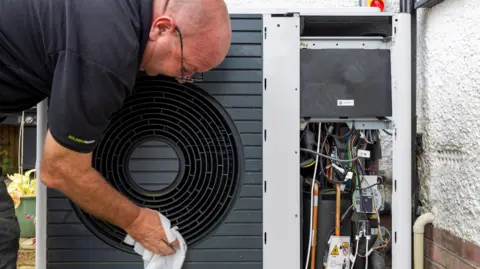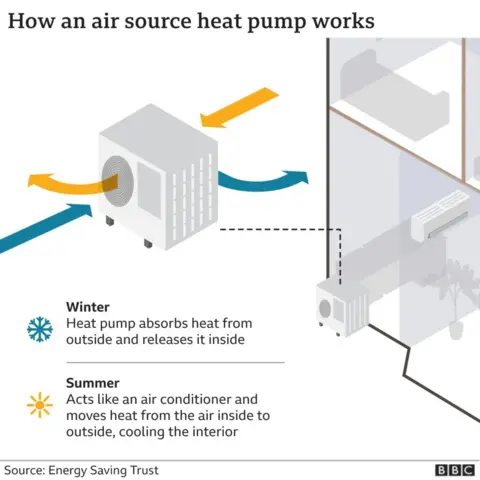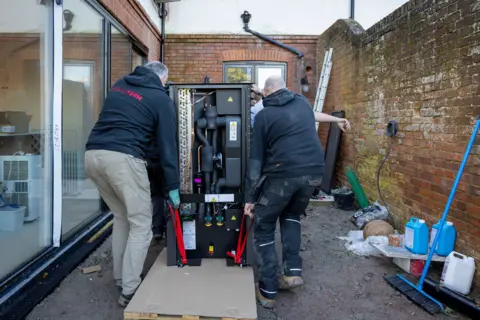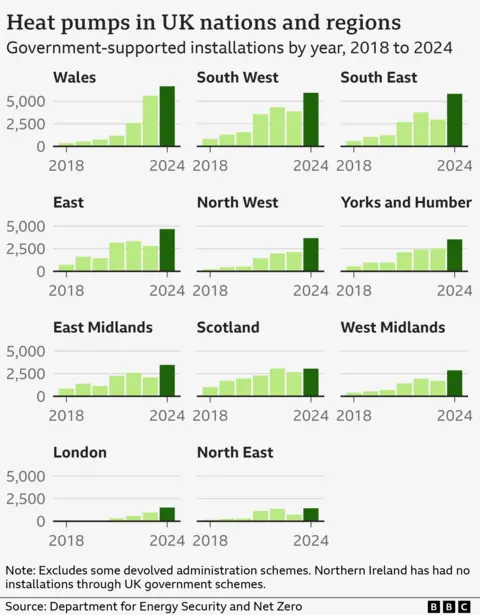What are heat pumps and how much do they cost?
 Andrew Aitchison/Getty Images
Andrew Aitchison/Getty ImagesA planning restriction that prevented heat pumps being installed within a metre of a neighbour's property has been removed.
The government hopes the move will encourage more people to install the low-carbon technology.
However, installation rates will need to increase substantially if the government wants to meet its target of 600,000 heat pumps being fitted each year by 2028.
What are heat pumps and how do they work?
Heat pumps run on electricity instead of gas. They warm buildings by absorbing and amplifying heat from the air, ground, or water.
They are widely seen as the best way of cutting emissions of carbon dioxide - a planet-warming gas - from home heating, which accounts for 14% of the UK's carbon emissions.
Heat pumps are more efficient than gas boilers and can use electricity generated from increasingly clean sources, as wind and solar power replace polluting fossil fuels.
Air-source pumps - the most common type - suck in outdoor air and pass it over tubes containing refrigerant fluids which concentrate and boost the warmth to produce heat.
The system consists of a box measuring about 1m x 1m x 0.4m which stands outside the property, as well as a heat pump unit and hot water cylinder inside the property.
The indoor unit is about the size of a gas boiler, while the cylinder depends on the size of the home.

Ground-source heat pumps are more efficient than air-source models.
However, they are typically more expensive and less commonly used, as they require either a deep bore hole or a horizontal system dug into the ground over a large area.
How much do heat pumps cost?
An air-source heat pump typically costs about £10,000 more than a gas boiler, according to the National Infrastructure Commission (NIC).
Installation costs can vary greatly depending on the changes needed to fit the pump into a property.
To encourage people to make the switch, the Boiler Upgrade Scheme provides a grant of £7,500 to help with the extra costs in England and Wales.
However, the UK's spending watchdog warned in 2024 that costs remain too high for many.
The grant can be used for existing homes and non-domestic buildings in England and Wales. The property must have an eligible Energy Performance Certificate (EPC), issued in the last 10 years.
Changes to the rules mean homes are no longer required to have existing loft or cavity wall insulation, which could save around £2,500 in upfront costs. A well-insulated home can help a heat pump perform more efficiently.
The scheme is not available if you live in social housing or a new-build property. Tenants in private rented accommodation are also eligible but the landlord has to apply.
Scotland, external and Northern Ireland, external have separate schemes to help make homes more efficient.
Could a heat pump save me money?
While the upfront costs are currently substantial, heat pumps could become cheaper to run than gas boilers, according to the Climate Change Committee (CCC), which advises the UK government on cutting emissions.
The cost depends on individual energy prices and how efficiently the heat pump works.
Electric heat pumps use much less energy than gas boilers, but electricity typically costs more than gas.
Energy deals designed for heat pump owners can also help households make savings.
The CCC has called on the government to prioritise making electricity cheaper for everyone, which would make heat pumps more attractive.
 Andrew Aitchison/Getty Images
Andrew Aitchison/Getty ImagesAre heat pumps noisy?
Previously, homeowners needed planning permission if they wanted to put a heat pump within one metre of their neighbour's property - because of concerns over noise.
The rule was dropped in May to accelerate the uptake of heat pumps.
Concerns over noise are also less of an issue with newer devices, though units will still be required to be below a certain volume level.
The level has been set at 42db which is a similar output to that of a fridge.
The planning changes also include a relaxation of the rules for the size and number of heat pumps households can install.
How many heat pumps have been installed in the UK?
Rates of heat pump installation in the UK are lower than in other major European countries, such as France, Germany and Italy.
But sales are increasing. Nearly 100,000 heat pumps were sold in 2024, up from about 60,000 in 2023, according to the Heat Pump Association.

However, the CCC says this number needs to rise to nearly 450,000 a year by 2030 and 1.5 million by 2035 to help meet climate targets.
It says around half of UK homes need to have heat pumps by 2040.
Significantly more trained heat pump installers are needed to achieve this.
Do I have to replace my gas boiler?
There is no requirement to replace your existing boiler before the end of its life. Households can still buy a new gas boiler if they wish.
However, the CCC recommends that all new home heating should be low-carbon after 2035.
Most of this will mean using heat pumps, but it acknowledges that other approaches may be more appropriate in some cases - such as direct electric heating in homes with lower heat demand.
But the CCC wants the government to rule out the possible use of hydrogen in home heating to provide certainty to customers and industry.

Sign up for our Future Earth newsletter to keep up with the latest climate and environment stories with the BBC's Justin Rowlatt. Outside the UK? Sign up to our international newsletter here.
